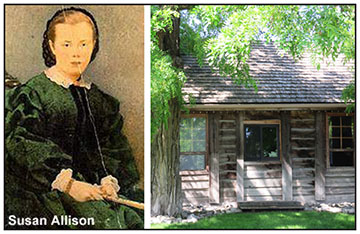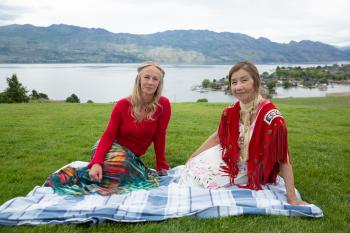Image Caption
Summary
Local Journalism Initiative Reporter
Windspeaker.com
On Dec. 14, Telus originals will start streaming the music documentary The Lake / nx̌aʔx̌aʔitkʷ for free.
It is a story about a friendship between a Heather Pawsey and Westbank First Nation Elder and artist Delphine Derickson.
The film captures their relationship and collaboration as they transform a historic opera by incorporating syilx perspectives and culture on the stage while also showing the successes and some failures of the project.
The Lake, an opera written by Barbara Pentland and poet Dorothy Livesay in 1952, was discovered by Pawsey in 1995 as a handwritten score filed at the Canadian Music Centre.
“Barbara Pentland, was actually one of the very few women who was writing classical music in Canada in the 1950s,” said Pawsey. “Even today, it’s really difficult… for women to be taken seriously in classical music. Composers and women’s music make up like eight per cent of all orchestra programming. Pentland was also the first woman hired to teach music composition theory at the University of British Columbia.
In 1995, Pawsey was searching for an original aria to perform at the Eckhardt-Gramatte National Music Competition.
“I really wanted to sing an aria from a Canadian opera because I’m very passionate about Canadian music….We have amazing music here and nobody really gives it credit,” she said. “I found this opera called The Lake.”
“When I opened it, I don’t know, it was just, there was something about it,” Pawsey said. “Like it chose me. Like I really believe that it chose me, I didn’t choose it. And then I found out that it had never been performed and I knew who Barbara Pentland was.”
The Lake was written about John and Susan Allison who were the first European settlers in West Kelowna at West Bank First Nation in the Okanogan.
In total, the opera was about 35-minutes long and is based on Allison’s memoirs. The opera’s story is about how two women came together despite language and cultural barriers and became friends.
“It was a true story written on her memoirs and recollections, which were published about the day (in 1873) that she, Susan Allison, believes she saw the creature of the spirit who lives in Lake Okanagan,” said Pawsey.
“So, it was kind of like ‘wow, okay, there are two Indigenous characters in this opera and it’s based on Indigenous culture and spirituality’. Susan Allison was intensely interested in the culture around her.”
The memoirs tell the tale of how Allison learned to speak Chinook and how she spent time learning the culture she had been immersed in.
Once the opera had been written, the group from the East Coast that had requested Pentland and Livesay write it in the first place had disbanded. So the opera was never performed or published.
That is until Pawsey performed music from the opera and won the competition.
“That was kind of a big deal. That really started my career singing contemporary classical Canadian music,” she said.
At the time Pawsey had thought this would be the end of the magical story that led her to the score, but in reality it was just the beginning.

She was aware that the original events of Allison’s story were said to have taken place at Sunnyside Ranch, but Pawsey’s search for its location was unsuccessful.
Years later while at a wine tasting with her husband at Quails’ Gate, they were in a “little log cabin that is on the premises of the winery” and Pawsey came across a book about the history of the location. Then the owner explained that someone had once wrote a play about the settlement.
“But what I was looking at was the opera. Like the libretto of the opera that I had found. And I said ‘No, this isn’t a play. It’s an opera’. Then, he said, this is Sunnyside Ranch.”
Pawsey explained how she was overcome with excitement to be standing on the property, the vineyard that was once John and Susan’s Sunnyside Ranch. This “coincidence” was breathing life back into the opera.
“It was just like the, I don’t know, I’ll just call it the universe gave me that opera. I found it in the library. It found me… I found the place where it had actually happened, and so it was like the universe said, ‘okay, now you have to do it’,” said Pawsey.
“I couldn’t believe it. Like I found the actual place … standing in the actual house. I thought ‘I have to do this opera. I have to do this opera because Barbara Pentland, this was the only opera she ever wrote and she fought so hard for women to be taken seriously’,” Pawsey said.
She headed to Vancouver and began reaching out to musicians and instrumentalists and creating a concert, but on a smaller scale.
In 2012, two weeks prior to the official launch of the concert, Pawsey decided that because the story was about Okanagan culture and, originally, included two Indigenous characters, she wanted to have someone from that territory watch the performance and provide some perspective.
“We needed to have them come and educate us about things about their culture that we don’t know. Keep in mind this is 2012. So we brought Jordan Coble in from West Bank First Nation,” Pawsey said.
Coble explained that the spirit of the lake was Ogopogo serpent. He spoke of the significance of it to the people from the area.
Changes were made to the concert, and it was performed.
This is where Pawsey first met Delphine Derickson and a lifelong friendship was born.
Derickson said she watched the opera and was curious. She had never heard a live opera singer before, only on radio. And her dad would tell Derickson she had the kind of voice to sing opera.
“I believed him,” Derickson said.
She watched Pawsey perform and, although she loved her voice, she had a few issues with certain lines in the performance.
“So I told my friend I want to meet her backstage and talk to her about it because I’m the type,” Derickson joked, and so away she went backstage to meet Pawsey.
“I don’t think I introduced myself. I just told her (about the things she didn’t like). Then after I introduced myself… another thing I said is ‘this is our history’, because I told her ‘I’m a teacher and this is history that should be told and performed in Kelowna and West Bank, not Vancouver, because it didn’t happen in Vancouver. It happened here’.”
A sentiment that Pawsey agreed with wholeheartedly.
“We met in a hallway backstage and that’s when our hearts spoke to each other and we decided that we really wanted to work together and we wanted to do a full production of the opera,” said Pawsey.
“But, we were going to co-create it on West Bank First Nation land and we were going to bring in language, dance, culture, games…” Pawsey said.
Together they created a performance that was more than an hour long which was staged at the Quails’ Gate Estate Winery in 2014 on an outdoor stage overlooking the same view of the lake that Susan Allison had written about in her memoirs years prior.
Together they performed a song in both the syilx and Gaelic languages. In another performance, Derickson’s daughter Corinne choreographed and dances to a song performed just by the orchestra.
“It was so incredibly powerful and moving for the audiences and it, it really changed my life,” Pawsey said. “We spent two years going to West Bank First Nation and workshopping with Delphine, Corrine and Jordan.”
And then at that point Pawsey thought, ‘okay that’s done’, except it wasn’t.
In 2016, the Canadian Music Centre decided to create five short films to honour composers in British Columbia. They chose three men and two women and one of the women was Barbara Pentland.
“And that’s how I met my film director John Bolton,” said Pawsey.
Bolton had reached out to her because when he was hired to do these five films, everyone he spoke to about Pentland referred him to Pawsey because of the opera she performed.
“So, I told John about it and we did this insane 26-hour shoot,” Pawsey said.
“We drove to the Okanagan and we filmed … and he made this really beautiful little 15-minute film about the opera and Barbara Petland.”
Due to the overwhelming interest in the short film, Pawsey was then approached to be part of a feature-length documentary about the process, the opera, and all the teachings she had learned through the process. Bolton was hired as director for the Telus originals film.
“You get a bit of the opera, then you get interviews, and you get people reflecting, and then you get more of the opera,” Pawsey explained about the upcoming debut.
But what you really see is how two people from different cultures were able to create something beautiful together by being open to each other and not being afraid to ask questions.
“It’s really about building relationships and taking those relationships really seriously, which I do, and my life is just changed,” Pawsey said. “I just don’t look at anything the same way anymore and that’s (because) of everyone I’ve met with West Bank First Nation…
“I use the analogy of a journey. You know, you start on a journey when you think you know where you’re going and sometimes you end up in a completely different place. You don’t know how you got there, but you are incredibly grateful you did.”
Watch The Lake / nx̌aʔx̌aʔitkʷ starting Dec. 14 here at https://watch.telusoriginals.com/.

